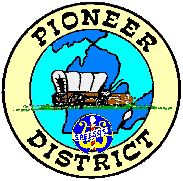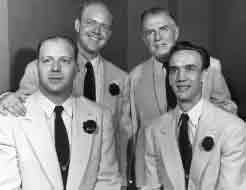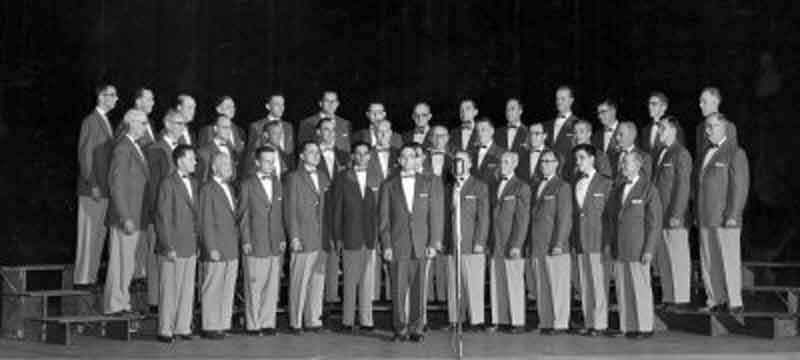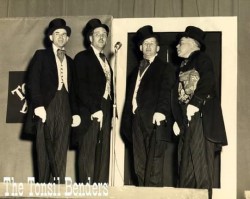


1953 happenings
The midwinter convention was held in Boston on January 16, 1953, and under the tutelage of Wayne's Ed Smith as international president, some major organizational changes were implemented. A House of Delegates was instituted at the international level with each district president having a vote along with the international board members and all past presidents. The International Board was reduced in size from 30 members to 16 including the officers. All future legislation would become the responsibility of the new House of Delegates, and the Board would become an administrative body only. The idea behind all of this was to democratize the Society as well as to streamline the conduct of affairs.
At this meeting it was decided also to mail the Harmonizer to each member, assessing a $1 increase to each member's dues, which meant mailing lists would be a top priority of the international office. The dues were raised from $5 to $5 per year, with $1 rebated to the districts. With the upcoming international convention scheduled for Detroit on June 10-15, 1953, and with the advent of a chorus contest, the decision was reached by the Board to move the contests which had been scheduled for the Grand Ballroom of the Sheraton Cadillac Hotel to the Masonic Auditorium. A resolution was also passed to insure that all members of a competing chorus were paid-up members of the chapter they represented, and that no member could sing in more than one chorus.
 Onchords
|
 Town Criers
|
The Fruit Belt Chapter and Benton Harbor hosted the 1953 district convention and international preliminary quartet contest on May 2. New district officers elected at this meeting were Clarence Jalving of Holland, president; Loton Willson of Boyne City and Don Wright of Hudson, vice presidents; Lou Harrington, secretary, and Tom Grove of Dowagiac as treasurer. Qualifying to represent Michigan in the international quartet contest to be held in Detroit, were the ONCHORDS of Saginaw (Bill Ahrens, tenor; Earl Keith, lead; Ed Peitsch, bari, and Dick Lee, bass), the TOWN CRIERS of Kalamazoo (Johnston, Baker, Cook and Barrett) and the WOLVERINES of Dearborn. The CLEF DWELLERS, four-time medalist quartet, were unable to compete in this contest due to the hospitalization of their lead singer Duncan Hannah. District Secretary Harrington obtained a certificate exempting all chapters in the district from the payment of the 20 percent Federal tax on admission to parades, which is still applicable. Secretary Lou Harrington made the announcement to the House of Delegates that the membership in the district had dropped to 1,802 with the loss of seven chapters. Upon recommendation of President Tubbs, a motion was made and passed unanimously that the district be divided into 15 areas.
The district attracts its fourth international convention and contest The 1953 international convention and contests were held in Detroit on June 11-15, 1953. The official sponsor of the convention was the Metropolitan Association of Chapters [the forerunner of our present Southeast Michigan Association of Chapters] with Seaborn Lawrence as general chairman and Lou Harrington as associate chairman. The international office staff and about 100 Detroit area barbershoppers worked diligently to make this convention an outstanding success. The headquarters hotel was the Sheraton Cadillac, with the contests taking place at the Masonic Temple. It was at this meeting that the international officers were informed that Carroll P. Adams was forced to resign his position as international secretary for health reasons. Bob Hafer, who had been working in the international headquarters in Detroit, was elevated to acting secretary in Adam's place. In the realignment of the International Board, Howard Tubbs of the Detroit Chapter was elected to a two-year term. The contests for the first time featured a chorus contest as well as quartet competition. Forty quartets representing all the districts were entered in addition to 18 choruses. Two choruses were entered from the Michigan District which included the GREAT LAKES Chorus from Grand Rapids under the direction of J. R. (Bob) Weaver and the Detroit PRECISIONAIRES under the direction of Ed Easley. Eighteen of the 50 quartets entered had never sung on the international stage before so there was a lot of new blood at this contest. The VIKINGS of Rock Island, Illinois, were declared the quartet champions, followed by the FOUR CHORDERS from London, Ontario, the SING-OPATES from Appleton, Wisconsin, the
ANTLERS from Miami, Florida [formerly from Michigan], and the STATESMEN from Sacramento, California. None of the Michigan quartet representatives made the finals. Michigan came on strong when the Grand Rapids Chorus under Bob Weaver won the chorus championship in this, the first international chorus competition. The Detroit chorus competed and performed well. Grand Rapids had to be good to sing down 17 other groups from all over the country under the leadership of the Society's finest directors. The success of this first chorus competition convinced Society leaders that chorus competition at the international level was a desirable activity and it has continued ever since. Other events of 1953 The second Michigan District chorus contest was held at Wright Park in Alma on July 19, 1953. Choruses were entered from Ionia, Holly-Fenton, Dowagiac, Lansing, Holland, Muskegon, Gratiot County and Detroit. Fran Hodgeboom, who had directed the Grand Rapids Chorus to the district championship the previous year, was now directing the Holland WINDMILL Chorus; and he brought the Dutchmen through with a first place finish. Detroit, with Ed Easley still at the helm, was second and Muskegon under Jim O'Toole was third. The rules at the time permitted both our first and second place choruses to compete at the international, and both Holland and Detroit appeared at Washington, D. C. in the 1955 international. The WINDMILL Chorus was dressed in traditional Dutch costumes complete with caps and wooden shoes. The large crowd of spectators was especially impressed with the costumed chorus. The costumes were loaned by the Holland Chamber of Commerce. The chorus won the championship with its presentation of two songs, "Breeze" and "Honey Man." Judges based their decisions on harmony accuracy, voice expression, song arrangements, stage presence, balance and blend. Judges were Mark P. Roberts of Grosse Pointe, chairman, Edwin S. Smith of Wayne, Henry Schubert of Detroit, Loton V. Willson of Boyne City and Ed Gaikema of Grand Rapids. The theme of the day was "Keep America Singing," the song written by Willis Diekema of Holland and now being used throughout the nation as an inspiration for the preservation of barbershop quartet singing. Director Hodgeboom led the mass combined choruses in singing the popular song, which at the time was being considered for the national theme song of the organization. The International Chorus Trophy presented The Grand Rapids GREAT LAKES Chorus, which was crowned district chorus champions in 1952, and was the current international champion at the time, sang several selections under the direction of Bob Weaver. At this time, they were presented with a beautiful trophy designed by Ben Landino of the Grosse Pointe Chapter. As Mark Roberts has put it so aptly; Sometime prior to the second Michigan District Chorus contest, I had asked Ben Landino, creator of the International Quartet Trophy, and a member of my chapter (Grosse Pointe), if he would make up a trophy for our Michigan chorus champions. I explained to Ben that we didn't need anything so elaborate as the International Quartet Trophy and he agreed and went to work. The trouble with Ben is that he doesn't understand mediocrity in handcrafting. What he brought to Alma indicated that he was only doodling and practicing when he made the Quartet Trophy. When the boys from the international office got a look at this beautiful creation, they insisted that it be donated to international for the International Chorus Trophy. This was done; and it is presently inscribed as the O.C. Cash Memorial Trophy, in honor of the Society's founder who had passed away on August 15, 1953. Later that year, Ben went to Grand Rapids and personally presented the trophy to the Grand Rapids Chorus, the first winner—a sort of all Michigan affair. In appreciation of what he had done, Ben's chapter, Grosse Pointe, made him a life member of the chapter. The Charlevoix Labor Day weekend was ebbing In spite of the fact that the Charlevoix chapter had disbanded, the famous Labor Day "Jamboree" founded by that group was continued over the holiday weekend through the enterprise of the Grosse Pointe Chapter. Not willing to give up this event as a SPEBSQSA gathering, a group of down-starters got together and decided to carry on as usual. There was a bit of nostalgia about it all. When Burt Escott, after whom the annual ball was named, arranged for accommodations, he decided upon the Stroud cabin layout as the home of the visitors. It was here that barbershoppers first assembled 11 years before when a group of Grand Rapids Chapter members, headed by the HARMONY HALLS, began the tradition of the Charlevoix Jamboree. The Grosse Pointers carried out the work much as it had always been done. Of course there was no public show; but members of the old chapter, plus some townspeople who liked the annual affair, gathered for a big sing and party Saturday night. On Sunday another tradition was preserved when the Grosse Pointers assembled in the park and sang. There was plenty of woodshedding everywhere. The chapter members, who with their wives, made the trip were Burt Escott, Ray Gunn, Steve Rickel, Ken Smith, Clyde Centers, Jim Adams, Bud Shaughnessy, Ole Olson, Bob Collins, Herb Kiersey, Hal Reinhardt, Frank Kropp and Jim Davenport. The fall district quartet contest at Lansing With the 1953 international preliminary and the international convention over, the next big event on the agenda was the 1953 district meeting and quartet contest. Lansing was the scene for this event on October 16-17, 1953, and John Hill and his cohorts from the Lansing Chapter were well prepared as hosts. Thirteen quartets showed up for the contest and after hearing the best offerings of the TOWN CRIERS, the PITCHBLENDAIRES of Detroit, FOUR STARS of Holland, FOR TUNE-TELLERS, the ONCHORDS, the WOLVERINES, the AIRE-TONICS of Muskegon, TONSIL BENDERS of Jackson, the CHORDIAL FOUR of Lansing, DEMONAIRES of Ann Arbor, the KEY WANDERERS of Hudson, the STARLINERS of Muskegon, and the MAKESHIFT FOUR of Gratiot County, the judges gave the nod to the WOLVERINES (Rehkop, Sipots, Sipots and Bond). Second place was taken by the ONCHORDS (Ahrens, Keith, Peitsch and Lee), and third place went to a new quartet, the AIRE-TONICS from Muskegon (Bill Wickstrom, tenor; Jerry Guimond, lead; Tom Damm, baritone, and Clare Bristol, bass). The FOR-TUNE TELLERS of Jackson (Cushman, Cushman, Queens and Knorpp) won the junior title and the PITCHBLENDAIRES of Detroit (Jack Golding, tenor; Dale Clixby, bari; Don Golding, bass, and Tom Pollard, lead) were declared the novice champions for 1953.

Antlers

Windmill Chorus "53"

Great Lakes Chorus

Harmony Halls
Pitchblendaires

Tonsil Benders
[index]
[1951]
[1952]
[1953]
[1954]
[1955]
[Contents]
Page Updated